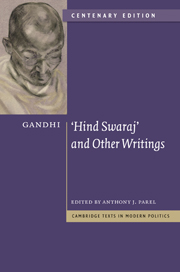Book contents
- Frontmatter
- Contents
- Preface to the centenary edition
- Acknowledgements
- Editor's introduction to the centenary edition
- Editor's introduction to the 1997 edition
- A note on the history of the text
- Principal events in Gandhi's life
- Biographical synopses
- Guide to further reading
- Glossary and abbreviations
- HIND SWARAJ
- SUPPLEMENTARY WRITINGS
- Gandhi's letter to H. S. L. Polak
- Gandhi's letter to Lord Ampthill
- Preface to Gandhi's edition of the English translation of Leo Tolstoy's Letter to a Hindoo
- Gandhi–Tolstoy letters
- Gandhi and the ‘Four Canonical Aims’ of Life (Purusharthas)
- Gandhi–Nehru dialogue
- Economic development and moral development (1916)
- Gandhi on machinery (1919–47)
- Constructive programme: its meaning and place (1941, rev. 1945)
- Gandhi's political vision: the Pyramid vs the Oceanic Circle (1946)
- Draft Constitution of Congress (1948)
- Bibliography
- Index
Draft Constitution of Congress (1948)
The Pyramid vs the Oceanic Circle (1946)
Published online by Cambridge University Press: 05 October 2014
- Frontmatter
- Contents
- Preface to the centenary edition
- Acknowledgements
- Editor's introduction to the centenary edition
- Editor's introduction to the 1997 edition
- A note on the history of the text
- Principal events in Gandhi's life
- Biographical synopses
- Guide to further reading
- Glossary and abbreviations
- HIND SWARAJ
- SUPPLEMENTARY WRITINGS
- Gandhi's letter to H. S. L. Polak
- Gandhi's letter to Lord Ampthill
- Preface to Gandhi's edition of the English translation of Leo Tolstoy's Letter to a Hindoo
- Gandhi–Tolstoy letters
- Gandhi and the ‘Four Canonical Aims’ of Life (Purusharthas)
- Gandhi–Nehru dialogue
- Economic development and moral development (1916)
- Gandhi on machinery (1919–47)
- Constructive programme: its meaning and place (1941, rev. 1945)
- Gandhi's political vision: the Pyramid vs the Oceanic Circle (1946)
- Draft Constitution of Congress (1948)
- Bibliography
- Index
Summary
Written on the day before his assassination, the following document is popularly known as Gandhi's ‘Last Will and Testament’. Watching the behaviour of India's political intelligentsia after independence Gandhi became convinced that they were more interested in making personal gains than in serving the people. It confirmed his fear, already expressed in Hind Swaraj, ch. iv, that home rule without swaraj would only mean the replacement of the British ‘tiger’ by the Indian ‘tiger’. To the last Gandhi believed that political, social and economic development could become a reality only when swaraj as political self-government was accompanied by swaraj as moral self-rule. Gandhi's last political message is that in a free society political parties must be inspired by the ideal that politics is a form of public service rather than a means of dominating fellow citizens. [Ed.]
January 29, 1948
New Delhi
Though split into two, India having attained political independence through means devised by the Indian National Congress, the Congress in its present shape and form, i.e., as a propaganda vehicle and parliamentary machine, has outlived its use. India has still to attain social, moral and economic independence in terms of its seven hundred thousand villages as distinguished from its cities and towns. The struggle for the ascendancy of civil over military power is bound to take place in India's progress towards its democratic goal. It must be kept out of unhealthy competition with political parties and communal bodies.
- Type
- Chapter
- Information
- Gandhi: 'Hind Swaraj' and Other Writings , pp. 184 - 186Publisher: Cambridge University PressPrint publication year: 2009



